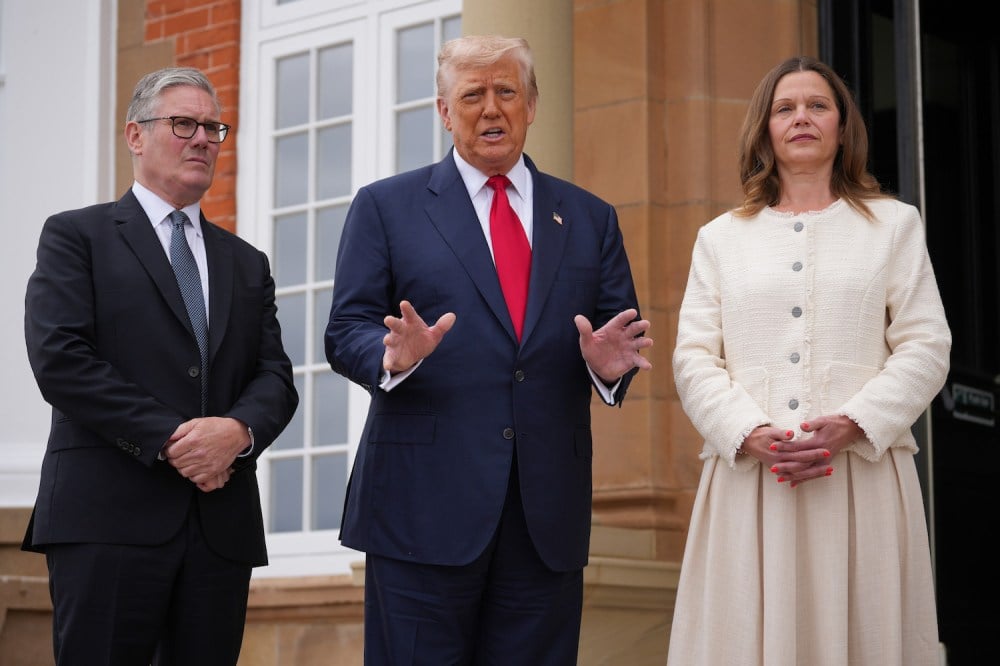Welcome back to World Brief, where we’re looking at evidence of mass starvation in Gaza, Thailand striking a cease-fire deal with Cambodia, and potential problems in the U.S.-European Union trade framework.
‘Those Children Look Very Hungry’
U.S. President Donald Trump often echoes Israeli talking points concerning Gaza, much to the frustration of European nations, which are becoming increasingly disillusioned with Israel’s war against Hamas. But on Monday, Trump appeared to break that pattern by publicly disputing Israeli Prime Minister Benjamin Netanyahu’s claim that mass starvation in Gaza is being overstated.
Welcome back to World Brief, where we’re looking at evidence of mass starvation in Gaza, Thailand striking a cease-fire deal with Cambodia, and potential problems in the U.S.-European Union trade framework.
‘Those Children Look Very Hungry’
U.S. President Donald Trump often echoes Israeli talking points concerning Gaza, much to the frustration of European nations, which are becoming increasingly disillusioned with Israel’s war against Hamas. But on Monday, Trump appeared to break that pattern by publicly disputing Israeli Prime Minister Benjamin Netanyahu’s claim that mass starvation in Gaza is being overstated.
“We have to get the kids fed,” Trump said while meeting with British Prime Minister Keir Starmer in Scotland on Monday, adding that based on images of starving Palestinians seen on TV, “those children look very hungry.”
Since the Israel-Hamas war began in October 2023, more than 130 Palestinians have died from malnutrition, the majority being children and a significant portion of whom died within the last month, according to the Gaza Health Ministry. More than 1,000 others have also been killed by Israeli forces in recent weeks while trying to access food. “It’s a humanitarian crisis. It’s an absolute catastrophe,” Starmer said on Monday. “I think people in Britain are revolted at what they’re seeing on their screens.”
On Sunday, Israel announced 10-hour, temporary halts to military operations across parts of Gaza to allow Jordan and the United Arab Emirates to drop food and other humanitarian supplies into the territory. But rights groups have argued that aerial aid drops are no substitute for land crossings, which Israel is still largely blockading. And foreign powers have demanded that the United States take on a larger role to help address reports of mass hunger, which some former Israeli officials and Israel-based nonprofits have now suggested point to evidence of Israel committing genocide against Palestinians in Gaza.
Dozens of foreign ministers convened at the United Nations on Monday for a conference to discuss supporting a two-state solution and working toward the establishment of a Palestinian state. In his opening remarks, U.N. Secretary-General António Guterres implored participants not to let the meeting be “another exercise in well-meaning rhetoric,” saying it “can and must serve as a decisive turning point—one that catalyzes irreversible progress towards ending the occupation.” Already, France has vowed to recognize a Palestinian state beginning in September.
But with Israel and the United States boycotting Monday’s event—which was postponed in June after Israel launched attacks on Iran—experts worry that tangible progress still appears far off. Instead, French Foreign Minister Jean-Noël Barrot stressed that Monday’s discussion was aimed at providing a “political horizon” for future peace talks, with attendees acknowledging that a two-state solution likely won’t occur amid an ongoing war in Gaza and under Israel’s current leadership, which rejects the creation of an independent Palestine.
Although the Israel-Hamas war proved to be the top agenda item during Trump-Starmer talks on Monday, the two leaders also hashed out some trade concerns. Namely, Trump and Starmer expressed interest in resuming negotiations to address U.S. tariffs on British steel and aluminum, which remain at 25 percent despite the U.S.-U.K. trade framework agreed to in May. Trump on Monday warned that he will impose a new tariff between 15 to 20 percent, starting Friday, on countries that have not yet struck a deal with Washington; he did not say which nations this will affect, instead describing the tariffs as “for the world.”
Trump and Starmer also expressed frustration with Russian President Vladimir Putin, accusing him of being the impetus for a lack of cease-fire progress with Ukraine. In an effort to force Putin to the negotiating table, Trump on Monday shortened his 50-day deadline for Moscow, saying Russia now has 10 or 12 days instead of until early September to make peace with Kyiv or face a new round of sanctions.
Today’s Most Read
The World This Week
Tuesday, July 29: German Chancellor Friedrich Merz hosts Jordanian King Abdullah II in Berlin.
Wednesday, July 30: Thailand’s Supreme Court rules whether former Thai Prime Minister Thaksin Shinawatra served prison time while he was hospitalized in 2023-2024.
Thursday, July 31: U.S. Secretary of State Marco Rubio hosts South Korean Foreign Minister Cho Hyun in Washington.
Myanmar’s state of emergency, first imposed following the country’s February 2021 military coup, is set to expire.
Sunday, Aug. 3: Eight OPEC+ members hold a virtual meeting.
What We’re Following
Truce deal. Thailand and Cambodia agreed to an “immediate and unconditional” cease-fire beginning Monday at midnight, ending some of the most intense fighting between the two neighbors in more than a decade. “This is a vital first step towards de-escalation and the restoration of peace and security,” Malaysian Prime Minister Anwar Ibrahim said while standing beside the Thai and Cambodian leaders.
Malaysia, as chair of the Association of Southeast Asian Nations, mediated more than two hours’ worth of dialogue between the two sides amid pressure from the United States that it would not strike trade deals with Thailand and Cambodia until the conflict resolves. Bangkok initially pushed against third-party involvement, arguing that direct bilateral negotiations had not been exhausted.
Armed attacks ignited last week along the two countries’ 510-mile border after a mine explosion on Wednesday wounded five Thai soldiers. Over the next five days, dozens of people (mostly civilians) were killed and more than 300,000 others were displaced on both sides, with strikes reportedly hitting the Preah Vihear temple, a UNESCO World Heritage Site in Cambodia, as well as other civilian infrastructure. The attacks escalated a largely diplomatic conflict that first erupted in late May with the killing of a Cambodian soldier, which both sides blamed the other for.
Cooling trade tensions. Two EU officials admitted to Politico on Monday that the bloc does not have the ability to invest $600 billion in the United States, mere hours after pledging to do so as part of a landmark trade agreement with Washington. The framework, signed on Sunday, would impose a 15 percent U.S. tariff on most European goods—half of the rate that Trump originally threatened to impose—and will prioritize greater investments in U.S. energy and military infrastructure, which experts hope will help avert an all-out trade war between two of the world’s largest economies.
“It’s a very powerful deal, it’s a very big deal, it’s the biggest of all the deals,” Trump said on Sunday alongside European Commission President Ursula von der Leyen, who also called it “a good deal.”
However, the $600 billion that the EU initially pledged to invest is expected to come exclusively from the private sector, which Brussels has no authority over, instead of from taxpayers. The European Commission has not said whether it will introduce incentives to encourage private companies to meet this target.
At the same time, U.S. Treasury Secretary Scott Bessent resumed trade talks with senior Chinese officials in Stockholm on Monday. Negotiators aim to solidify a new agreement ahead of Aug. 12, by which time Trump has threatened to reimpose high tariff rates if no progress is made. The 90-day truce agreement about to expire was issued in mid-May to temporarily curb Washington’s minimum tariff rate of 145 percent and Beijing’s minimum retaliatory rate of 125 percent.
Instability in eastern Congo. Rebels with the Allied Democratic Force (ADF) opened fire on congregants at a Catholic church in the Democratic Republic of the Congo on Sunday, killing nearly 40 people. Another five people were killed in an attack on a nearby village. The ADF is backed by the Islamic State and is known for targeting civilians in eastern Congo as well as across the border in Uganda.
The mineral-rich eastern Congolese region has suffered extensive fighting in recent months between Congolese forces and the Rwanda-backed M23 militant group, and some experts suggest that the ADF has taken advantage of this unrest and subsequent power vacuum to further its own aims and avoid international attention.
According to the Congolese military, Sunday’s “large-scale massacre” was in retaliation for recent security operations targeting the ADF. However, M23 officials capitalized on the attack to accuse Kinshasa of “blatant incompetence” in its ability to protect residents. Meanwhile, U.N. peacekeepers warned that the church assault will “exacerbate an already extremely worrying humanitarian situation in the province.”
Odds and Ends
Congratulations are in order for Margo, a brown whippet who (along with her owner, Carl Barnes) won the United Kingdom’s Dog Surfing Championship in Dorset on Sunday. Some might argue that the humans put in more work, what with them paddleboarding through the waves while the dogs simply rode the bow in a move akin to Indonesia’s “aura farming” boys. But make no mistake: It’s hard to balance on four legs when there’s a crowd watching.




